
Introduction
Another year has passed and the state of democracy in Egypt is still going downhill all the way. The incidents that took place during 2020 have continued to negatively affect democracy and trample over the law.
- At the beginning of the year, specifically in February, former dictator Hosni Mubarak died and the Egyptian government declared three days of national mourning after holding a military funeral, which sparked controversy given that Mubarak was stripped of all military honors after his conviction in the “Presidential Palaces” Case.
- Then, in March, following the start of the outbreak of the coronavirus pandemic (COVID-19), the government took several measures to limit its spread, among which was the Supreme Judicial Council announcing the suspension of court proceedings. However, the outbreak of the pandemic wasn’t that enough for the Egyptian authorities to reduce severe overcrowding in prisons. Instead of releasing pretrial detainees and following the steps of many other countries in countering the effects of such pandemic, the authorities resorted only to refrain from transferring detainees from their jail to the courthouse or the competent prosecutions and, consequently, extend their detention without their presence and without hearing their defense in what is known as “on-paper detention renewal” phenomenon. Adding to the farce, the security forces have launched arrest campaigns against the opponents demanding the release of detainees amid the coronavirus outbreak. The list of those arrested included writers, activists, lawyers, and even doctors and physicians despite the heroic role they play to confront the pandemic.
- Parliamentary elections were then held, and the vote was marred with an extremely low turnout as well as many violations, not to mention the attempts to bring down a number of prominent opponents affiliated with the (25-30) bloc, such as former MPs Haitham Hariri and Ahmed Tantawi, in a scene that echoes the practices of the dissolved National Democratic Party.
- The same old violations persist and are compounded by a new kind of abuse, which is: the recycling/ rotation of pretrial detainees into new cases that carry the same charges pressed against them, while still serving their detention period.
- Pretrial detention orders have continued to be issued against human rights defenders, writers, journalists and opinion-holders opposing the policies of the current regime.
- Meanwhile, exceptional and military trials remained unchanged, alongside the extension of the state of emergency since it was first proclaimed in 2017, and the amendments made to terrorism laws, which entail expansion in defining the scope of terrorist entities and terrorists to widen the circle of opponents being placed on terrorism lists.
- Death sentences are still handed down on a regular basis in exceptional trials that do not meet minimum due process standards. Trials of symbols of a regime that the January Revolution sought to overthrow have been proceeding for years while their defendants are set free, at a time when many young people and opinion holders are languishing in prisons and years of their lives are wasted on constant pretrial detention renewals.
This is the seventh annual report released by Lawyers for Democracy Initiative to monitor the state of Egypt’s democratic path during 2020 in details, numbers, percentages and figures illustrating the measures and events affecting the democratic path during the year.
“Lawyers for Democracy” Initiative:
“Lawyers for Democracy” is an initiative launched by the Arabic Network for Human Rights Information (ANHRI) in 2014. It consists of a group of lawyers in a number of Egypt’s different governorates and cities to monitor the events, cases, and incidents that took place in the country; such as protests, conferences, strikes and official and non-official practices that affect Egypt’s democratic path. Lawyers of the initiative monitor and document these incidents and provide legal support if needed, and then they release reports to elucidate Egypt’s situation (from the partisan public sphere to the media and judicial field) when it comes to the rule of law, respect for freedom of expression and the democratic path.
Chapter 1
Protest events
During 2020 various political powers organized 364 different protest events, in spite of the measures taken by the authorities to face such protests and their constant and escalating efforts to thwart them using the Protest Law issued under former President Adly Mansour’s rule, and despite the coronavirus (COVID-19) pandemic.
The details of the 364 protest events that took place during the year and their distribution according to the different organizing powers and months are as follows:
The following table shows the number of protest activities and the security attacks they were subjected to during 2020:
| Month | Protests that didn’t face security attacks | Protests that faced security attacks | Protests resolved through negotiations |
Total in each month
|
| January | 6 | 19 | 3 | 28 |
| February | 4 | 19 | 3 | 26 |
| March | 3 | 18 | 5 | 26 |
| April | 2 | 22 | 0- | 24 |
| May | 6 | 17 | 6 | 29 |
| June | 7 | 21 | 2 | 30 |
| July | 4 | 25 | 3 | 32 |
| August | 3 | 26 | 2 | 31 |
| September | 50 | 14 | 4 | 68 |
| October | 22 | 4 | 3 | 29 |
| November | 17 | 5 | 5 | 27 |
| December | 12 | 0 | 2 | 14 |
| Total in 2020 | 136 | 190 | 38 | 364 |
The Egyptian authorities were specifically targeting the demonstrations organized in wide public streets, big squares and in the vicinity of Tahrir Square, and none of them were spared the attacks by the security forces.
Protests staged by political powers, particularly the National Alliance to Support Legitimacy (NASL) and the Muslim Brotherhood (MB), have declined as a result of the security attacks they are subjected to.
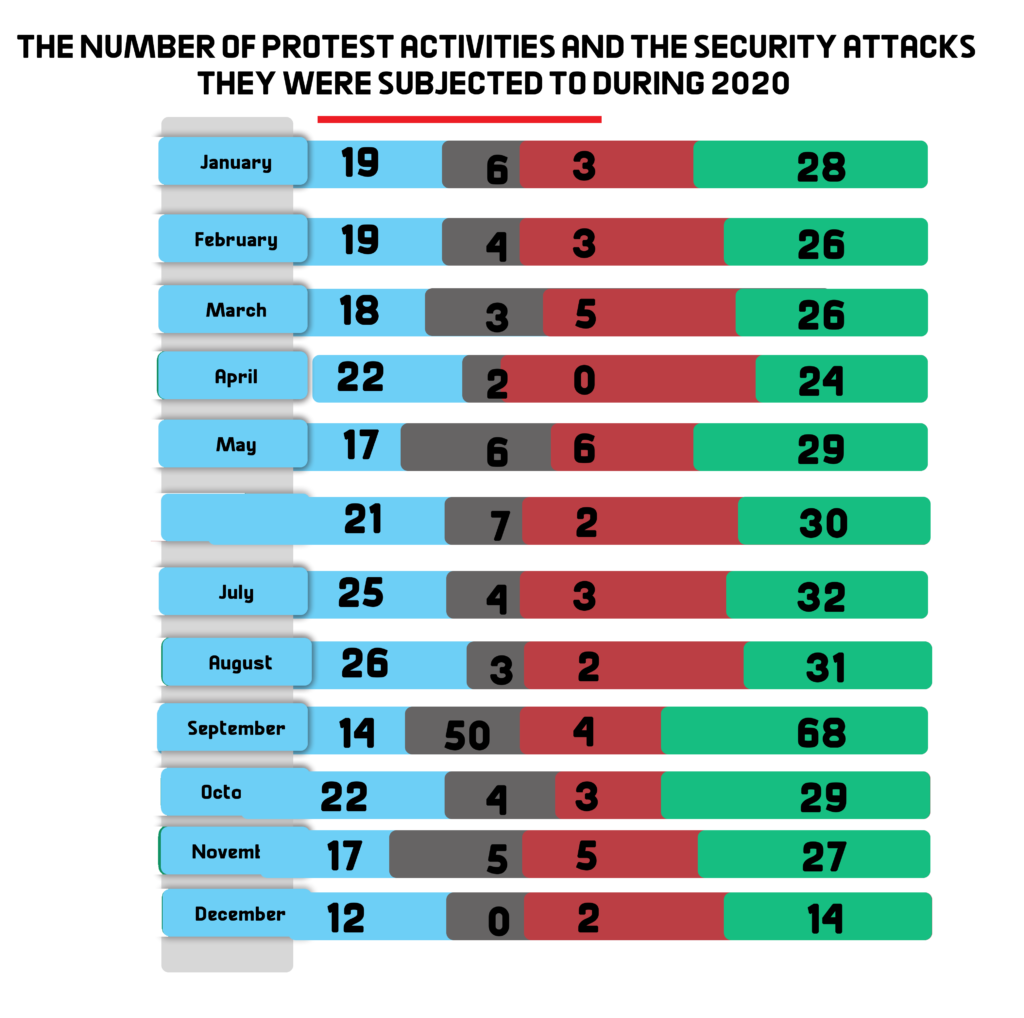
A comparison between the numbers of protests from 2014 to 2020
2020 ranks least in terms of the number of demonstrations; after years of systematic targeting of protests, either through legislation (The Protest Law) or security practices, along with the arrest and detention of protesters. Only 364 protests were organized during the entire year, whilst the year of 2018 saw only 491 protests being organized.
On the other hand, the year 2014, during which President al-Sisi officially took the reins of power, is the year that witnessed the largest number of demonstrations with 1,515 different protest events being organized. The year 2016 ranks second in terms of the highest number of protests with 1,318 different protest events being staged. That year saw a significant rise in the number of protests due to the deterioration of economic conditions, price hikes, and the signing of Tiran and Sanafir maritime border demarcation agreement. Back then, in 2015, 766 different events were organized, making it the third year that saw a low number of demonstrations, followed by 2017 with 779 protests and then 2018 with only 485 protest events.
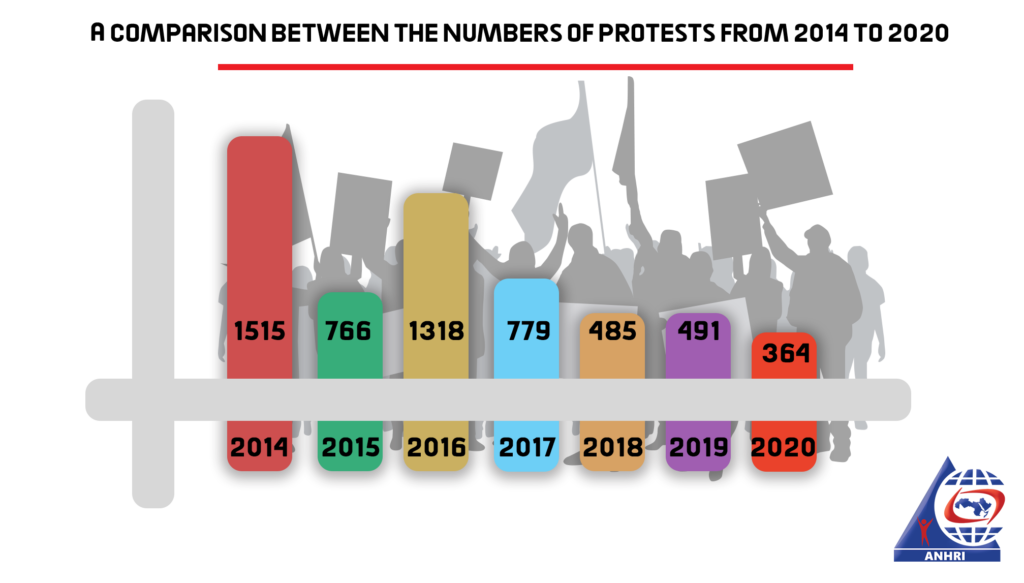
Pro and anti-regime protests
Thanks to the mass rallies that took place in conjunction with the holding of the parliamentary elections and the commemorations of the 6th of October War, the pro-regime activities continued, with 11 protest events being organized during the year, compared to 2019 which witnessed 29 events.
As usual, the Protest Law hasn’t been implemented on the pro-government protest events; as none of them was banned or attacked unlike with anti-government events.
While there were 353 events of opposition, the year only witnessed 11 pro-regime events as shown in the following table:
| Pro- regime events | Anti-regime events |
| 11 | 353 |
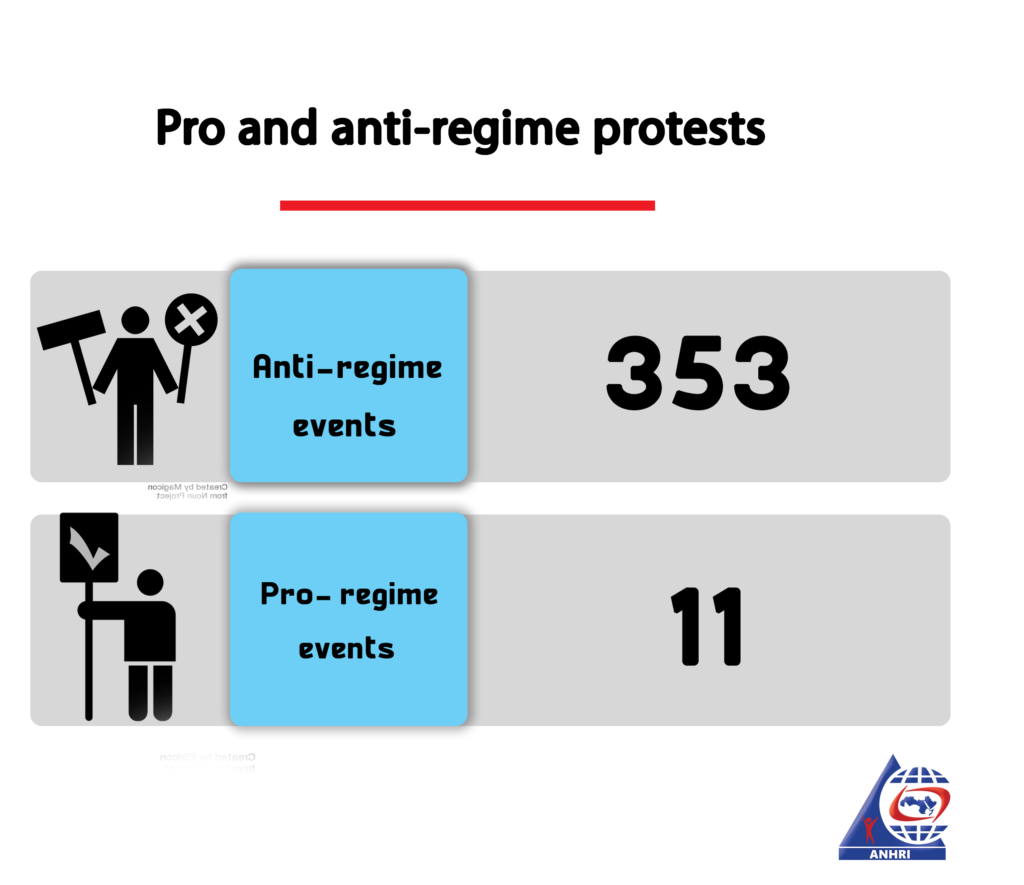
Security attacks on protest events:
During 2020, 364 different protest events were organized, out of which 190 protests were attacked by the security forces, while 136 went on without being attacked, and 38 were resolved by the authorities following negotiations with the protests’ organizers.
The following table shows the number of protest events that faced security attacks:
| Total number of events | Events that didn’t face security attacks | Events that faced security attacks |
Events resolved through negotiation
|
| 364 | 136 | 190 | 38 |
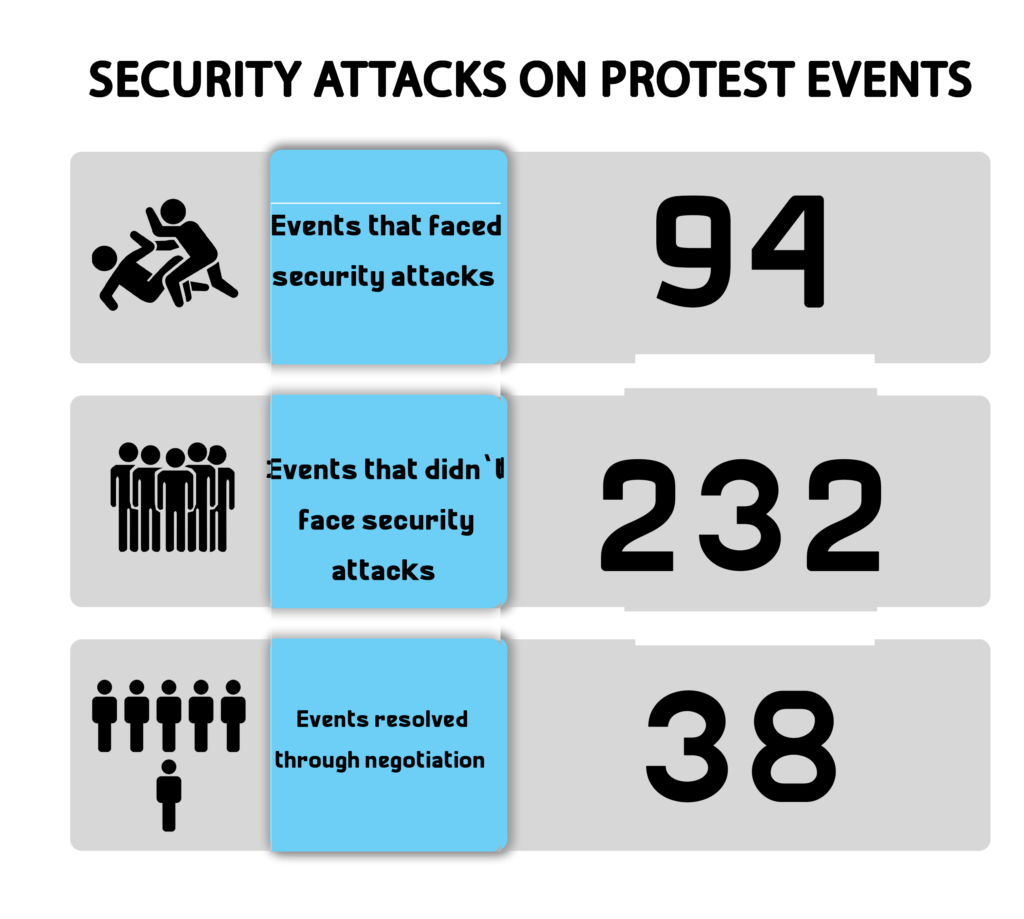
Protest events according to the powers organizing them:
Labor and Social Protests were at the forefront of the protests’ scene with 173 protests, followed by the protests organized by the Muslim Brotherhood (MB) and the National Alliance to Support Legitimacy (NASL) at 111 events. For the second year in a row, 2020 has witnessed what is known as “September 20 incidents” with 49 unclassified protest events organized.
The following table shows the number of protests according to the forces that organized those events:
| Forces organizing the protests | MB & NASL | Social and labor protests | Students protests | Civil and democratic powers | Pro-regime protests | Unclassified |
| Number of protests | 111 | 173 | 17 | 3 | 11 | 49 |
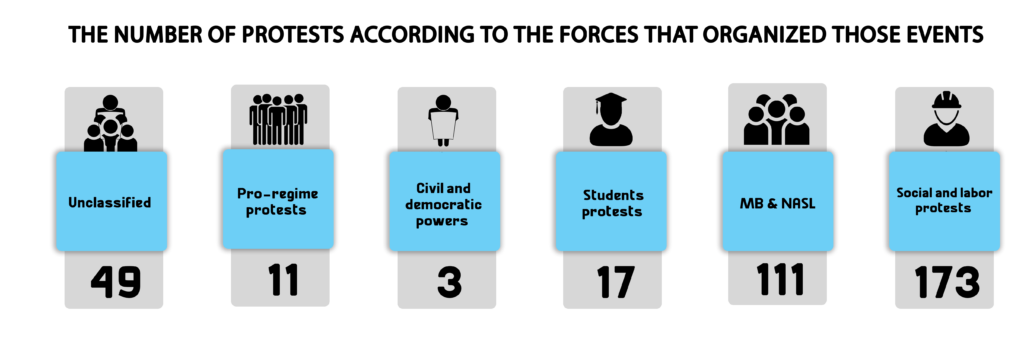
The most important demands by the different powers:
The demands raised by the protests varied widely owing to differences in the organizing powers. Here are the most prominent demands:
- Calling for the release of pretrial detainees due to the spread of COVID-19
- Protesting against poor economic and social conditions and demanding higher wages
- Protesting against the holding of the high school (Thanaweya) exams amid the coronavirus pandemic.
First: MB & NASL protest events:
During 2020, the protests organized by Muslim Brotherhood (MB) group and its ally, the National Alliance to Support Legitimacy (NASL), have significantly declined as a result of the security forces targeting the group and prosecuting its members, as both MB and NASL jointly staged only 111 protest events throughout the year, all of which are characterized by low participation/turnout rate and duration.
The following table shows the number of the MB and NASL’s protests per month:
| Month | Protests that didn’t face security attacks | Protests that faced security attacks |
Protests resolved through negotiations
|
Total |
| January | 10 | 4 | 0 | 14 |
| February | 10 | 3 | 0 | 13 |
| March | 8 | 0 | 0 | 8 |
| April | 8 | 0 | 0 | 8 |
| May | 8 | 3 | 0 | 11 |
| June | 12 | 4 | 0 | 16 |
| July | 3 | 7 | 0 | 10 |
| August | 8 | 0 | 0 | 8 |
| September | 5 | 0 | 0 | 5 |
| October | 4 | 2 | 0 | 6 |
| November | 6 | 2 | 0 | 8 |
| December | 4 | 0 | 0 | 4 |
| Total during 2020 | 86 | 25 | 0 | 111 |
June was the highest month in terms of the number of protest events organized by the MB & NASL to coincide with what they called the June 30 coup.
The security services continued to target the protests staged by the MB and NASL groups, with 25 protest events being attacked throughout 2020.
The following table shows the number of attacks on MB and NASL protests:
| Protests that didn’t face security attacks | Protests that faced security attacks |
Protests resolved through negotiations
|
Total |
| 86 | 25 | 0 | 111 |
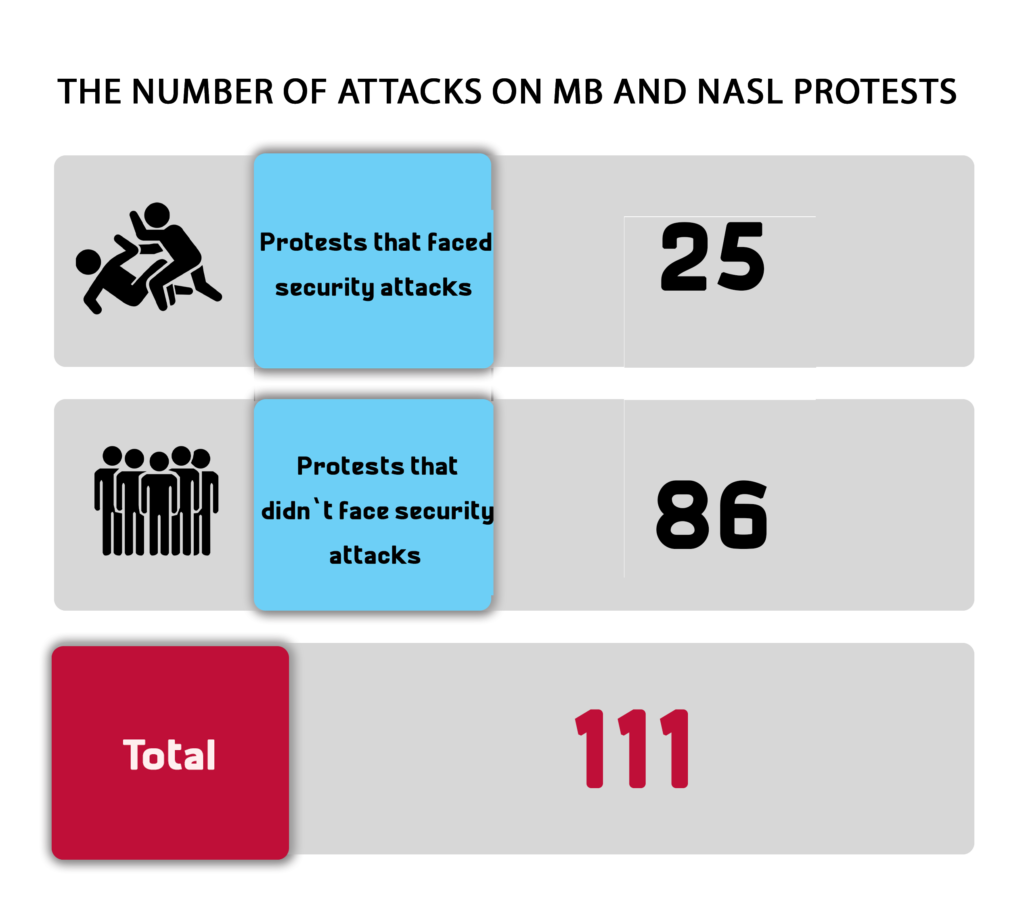
The most important demands brought by the Muslim Brotherhood (MB) and the National Alliance to Support Legitimacy (NASL) during 2020:
- Toppling what they called the military coup and demanding the removal of Sisi from office and the return to
- Demanding the release of the elderly leaders of the Muslim Brotherhood following the arrest of the group’s deputy supreme guide Mahmoud Ezzat.
- Protesting against the imposition of the state of emergency.
- Commemorating the dispersal of Raba’a al-Adawiya and al-Nahda sit-ins.
Second: Civil and democratic powers protest events
During 2020 there was a continuous decline in the number of protest activities organized by the democratic and civil powers; and this was due to the ongoing detention of a number of civil and democratic powers’ figures who managed to organize only three protests during the entire year, one of them passed without security intervention, while the two other activities were subjected to security attacks.
The following table shows the number of social and labor protests in 2020 per month:
| Month | Protests that didn’t face security attacks | Protests that faced security attacks | Protests resolved through negotiations
|
Total |
| January | 0 | 0 | 0 | 0 |
| February | 0 | 0 | 0 | 0 |
| March | 0 | 0 | 0 | 0 |
| April | 0 | 1 | 0 | 1 |
| May | 1 | 0 | 0 | 1 |
| June | 0 | 1 | 0 | 1 |
| July | 0 | 0 | 0 | 0 |
| August | 0 | 0 | 0 | 0 |
| September | 0 | 0 | 0 | 0 |
| October | 0 | 0 | 0 | 0 |
| November | 0 | 0 | 0 | 0 |
| December | 0 | 0 | 0 | 0 |
| Total in 2020 | 1 | 2 | 0 | 3 |
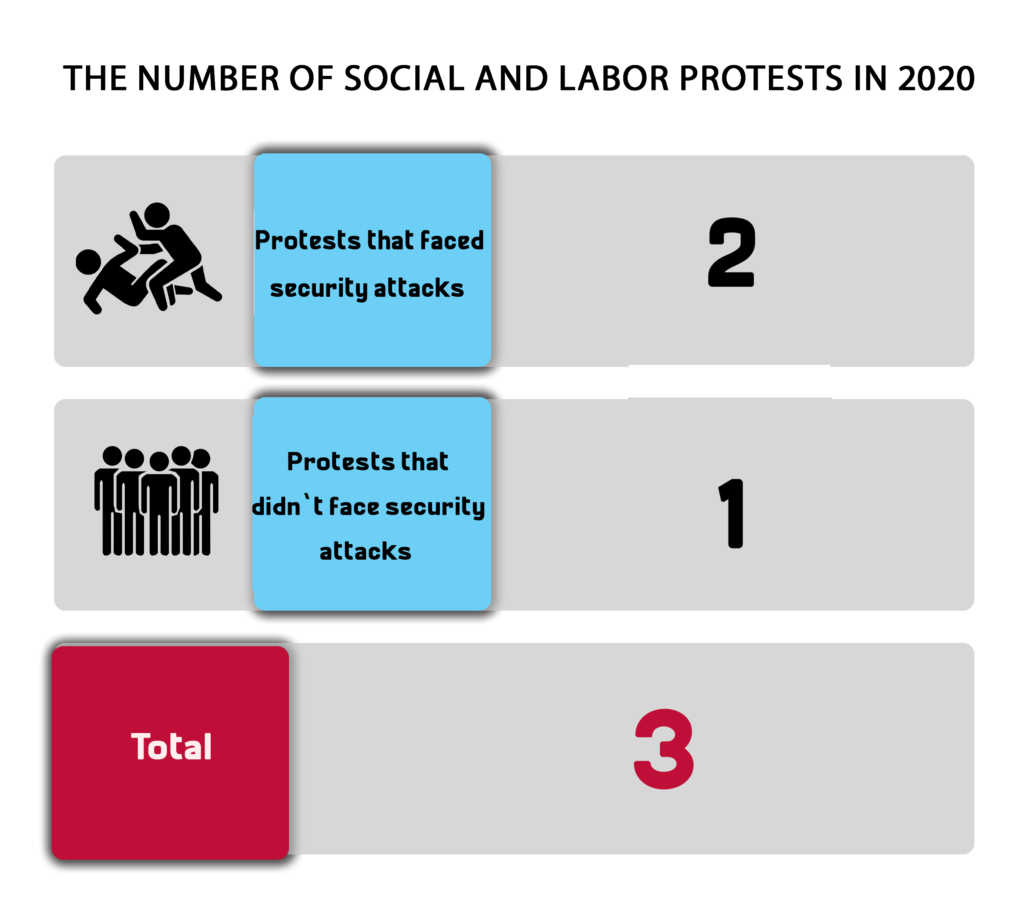
The most important demands brought by the civil and democratic powers during 2020:
- Demanding the release of pretrial detainees held pending publishing cases along with those who are not implicated in violence.
- The family of activist Alaa Abdel-Fattah demanding to receive a letter from him from inside his jail in Tora High Security Prison II amid a suspension of prison visits nationwide.
- Celebrating Labor Day.
Third: Social and labor protests
Labor protests continued in 2020 owing to the poor economic and living conditions, as the number of protest events organized during the year reached 173, most of which sought to improve the conditions of workers.
The following table shows the number of social and labor protests and their distribution in 2020:
| Month | Protests that didn’t face security attacks | Protests that faced security attacks | Protests resolved through negotiations
|
Total |
| January | 6 | 2 | 3 | 11 |
| February | 7 | 1 | 3 | 11 |
| March | 10 | 3 | 5 | 18 |
| April | 10 | 2 | 0 | 12 |
| May | 8 | 3 | 6 | 17 |
| June | 8 | 3 | 1 | 12 |
| July | 10 | 1 | 3 | 14 |
| August | 13 | 3 | 2 | 18 |
| September | 13 | 1 | 4 | 18 |
| October | 13 | 0 | 3 | 16 |
| November | 8 | 3 | 5 | 16 |
| December | 8 | 0 | 2 | 10 |
| Total in 2020 | 114 | 22 | 37 | 173 |
Attacks on social protests:
During 2020, the security forces intervened to forcibly disperse 22 protests organized by the labor and social powers and succeeded to resolve 37 events through negotiation, while it left 114 events without interference.
The following table shows the number of attacks on labor and social protests:
| Protests that didn’t face security attacks | Protests that faced security attacks | Protests resolved through negotiation | Total |
| 114 | 22 | 37 | 173 |
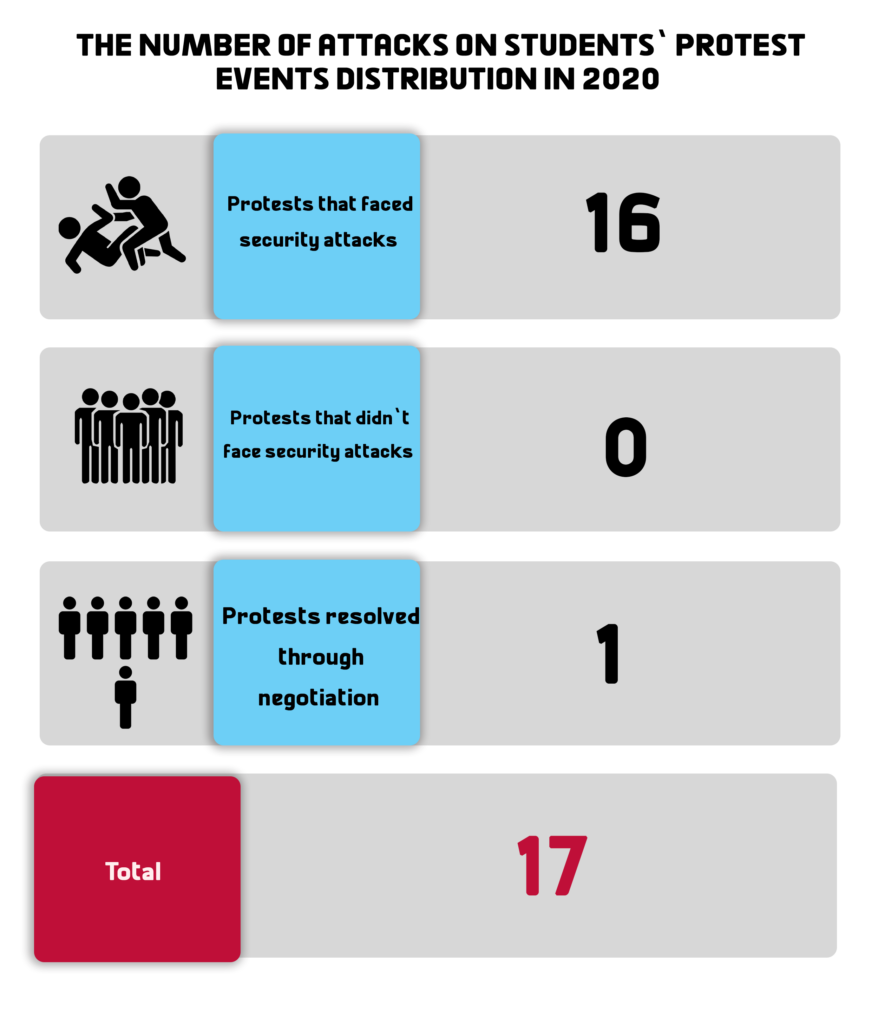
The most important demands of social protests in 2020:
– A number of workers protested their arbitrary dismissal and unfair termination demanding payment of their financial dues
– A number of workers demanded better benefits and security of tenure.
– A number of citizens protested the demolition of their houses objecting to Reconciliation Law on Building Violations.
– A number of nurses and medical staff protested the health conditions in hospitals and demanded to get tested for the coronavirus.
_ Zamalek Sports club employees protested the late salary payment and the non-receipt of their wages for several months.
– Demanding to apply the minimum wage.
– A number of fishermen objected to the Insurance Law and the increase in fuel prices.
Fourth: Students’ protests
During 2020 there was a continued decline in the number of protests organized by students as a result of the severe repressive measures taken by school and university administrations to ban the exercise of public affairs’ activities on campus. These measures have amounted to dismissal from the university/ school, thus depriving students of completing their studies. During the year, students organized only 17 protest events, which is the lowest rate compared to previous years.
The following table shows the number of student protests during 2020
| Month | Protests that didn’t face security attacks | Protests that faced security attacks |
Protests resolved through negotiation
|
Total |
| January | 0 | 0 | 0 | 0 |
| February | 2 | 0 | 0 | 2 |
| March | 0 | 0 | 0 | 0 |
| April | 3 | 0 | 0 | 3 |
| May | 0 | 0 | 0 | 0 |
| June | 0 | 0 | 1 | 1 |
| July | 5 | 0 | 0 | 5 |
| August | 0 | 0 | 0 | 0 |
| September | 0 | 0 | 0 | 0 |
| October | 3 | 0 | 0 | 3 |
| November | 3 | 0 | 0 | 3 |
| December | 0 | 0 | 0 | 0 |
| Total in 2020 | 16 | 0 | 1 | 17 |
Attacks on students’ protests:
During 2020, the security forces succeeded in resolving one student protest event via negotiations, while leaving 16 other events without any intervention.
The following table shows the number of attacks on students’ protest events
| Events that didn’t face attacks | Events that faced attacks |
Events resolved through negotiation
|
| 16 | 0 | 1 |
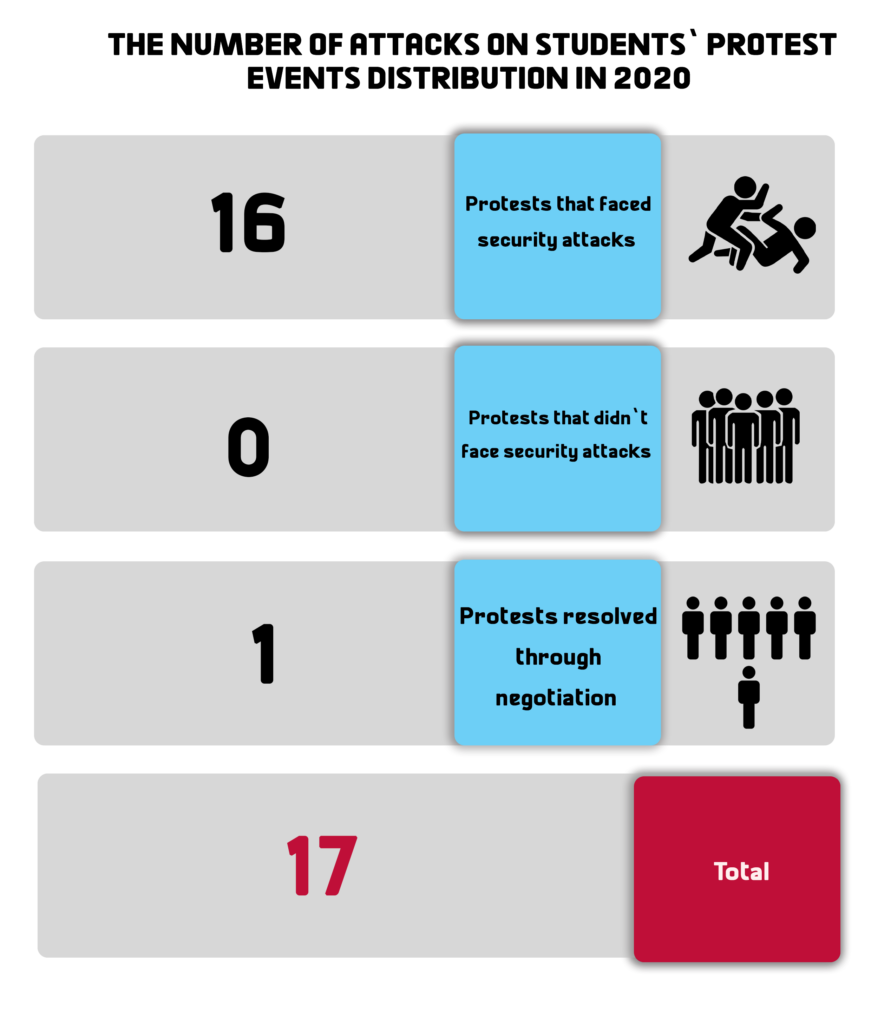
The most important demands by students’ protests:
- Kafr El Sheikh nursing school students objecting to the decision to transfer them to another school that is far from their place of residence.
- Students from Al-Shaheed Abido staged a protest to mourn the death of Brigadier Mustafa Abdel-Majid Abido and to support the state against terrorism.
- A number of university students objected to the internet-based examination system and demanded to replace it with a research project
- A number of students and their parents protested the attitude of a bookshop’s owner in Tanta city after he cheated and deceived them by asking for more money in exchange for preparing research projects for them, demanding from the security services to arrest him.
Fifth: Pro-regime protests:
During 2020, 11 different protest events supporting the authorities and the current regime took place, and none of them were attacked by the security services. The most prominent three events were held during the month of January coinciding with the January Revolution anniversary, but with the aim to commemorate the National Police Day, and to cut off the road before opponents and prevent them from celebrating the January Revolution.
Four other pro-regime events were organized in August 2020 in conjunction with the parliamentary elections, along with 4 other activities during the month of October as part of the state’s celebrations of the anniversary of the Sixth of October War.
Chapter 2
Ongoing Trials and Judicial Rulings
First: Ongoing trials
ANHRI monitored 78 deliberated trials that were considered before the Egyptian judiciary against the different political powers, Mubarak’s regime figures, and the post-June 30 regime affiliates during 2020. Of these trials, 73 were being considered by civilian courts and 5 by the military judiciary.
The following figures show the number and percentage of ongoing trials considered by both civilian and military courts:
| Civilian courts | Military courts |
| 73 | 5 |
| 93% | 7% |
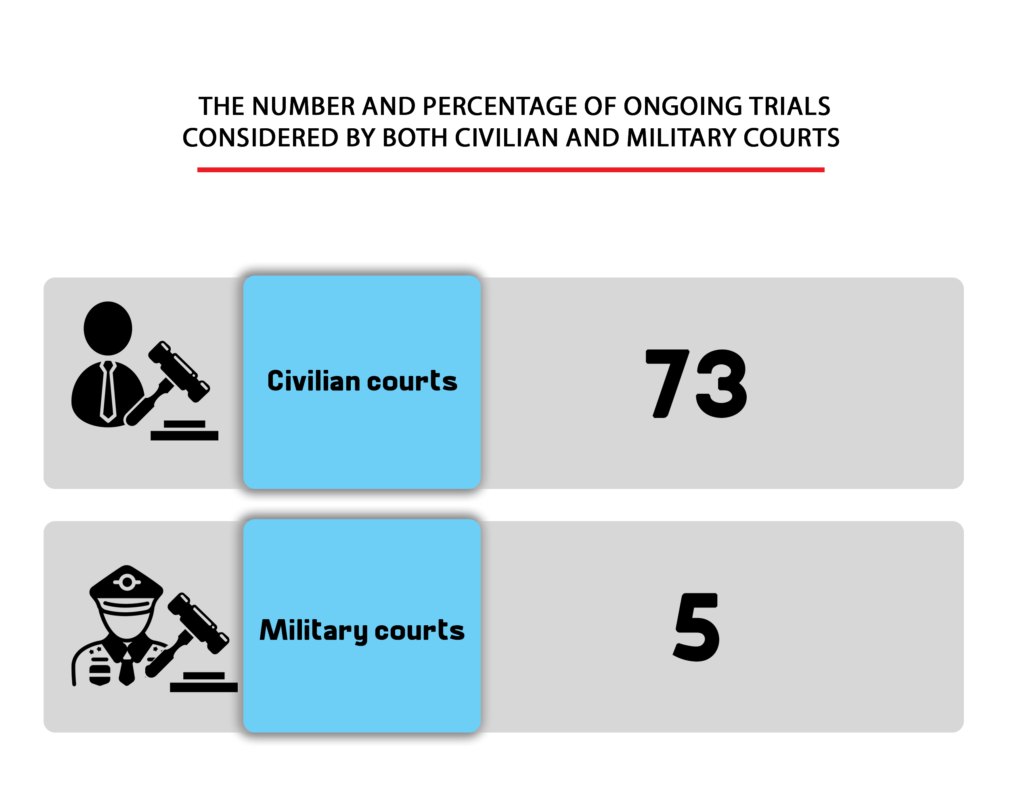
1- Trials deliberated by the civilian judiciary:
During 2020 there was a continued rise in the number of trials against various political powers; due to the slow judicial process and the lack of rapid adjudication over trials on the one hand, and the introduction of new cases on the other hand. The civilian judiciary is considering 73 trials related to public affairs against different political powers.
The following table shows the number of ongoing trials against the different political powers
| MB and NASL | Civil democratic powers | Mubarak’s regime | Post-June 30 regime | Total in 2020 |
| 56 | 8 | 6 | 3 | 73 |
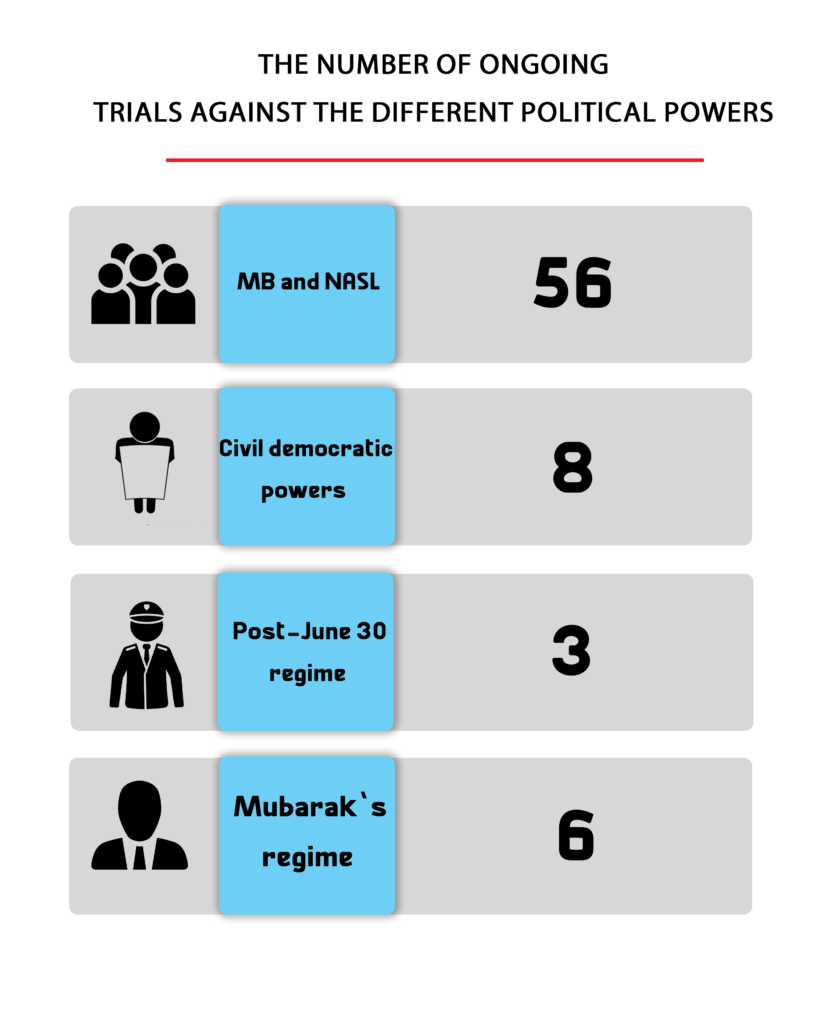
The Muslim Brotherhood (MB) group remained on top of all the powers facing trial, followed by the civil and democratic powers, and then came in third place Mubarak’s regime figures whose trials have yet to be adjudicated over for years, as part of the cases that had been lodged against Mubarak’s regime affiliates in the wake of January 25, 2011 Revolution.
2- Military trials for civilians:
The year 2020 saw the deliberation of military trials against civilians and citizens who were brought before the special (exceptional) military tribunals.
During the year, 5 ongoing trials were considered before the military judiciary, compared to 13 trials in 2019, 24 trials in 2018, 38 trials in 2017 and 32 trials in 2016.
In 2020, 1132 civilians appeared before the military judiciary, while in 2019, the number of civilians brought to military trials was 1832, compared to 1562 in 2018, 1869 in 2017 and 3037 in 2016.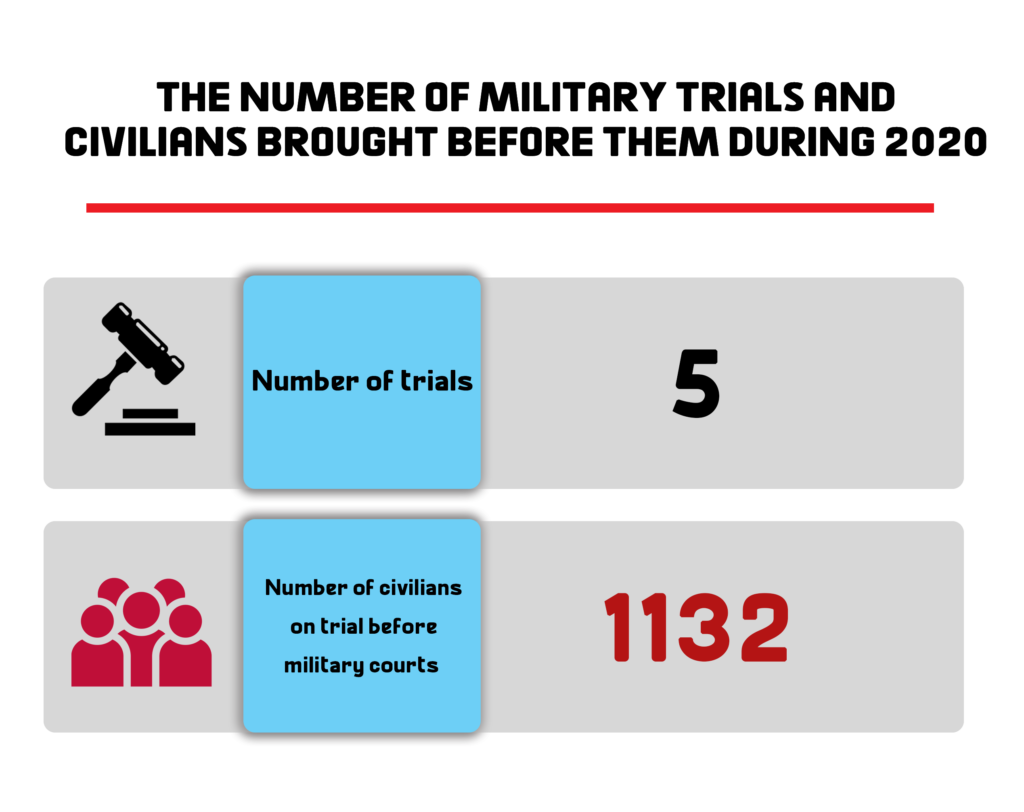
Second: Judicial Rulings
99 sentences were handed down by the Egyptian judiciary in 2020 over cases related to public affairs; of these, there were 75 rulings of conviction, 22 acquittals, and two suspended sentences issued by the criminal courts.
1- Convictions:
During the year, 75 convictions were issued against the different political powers; 4 rulings were handed down by the military judiciary against civilians, and the MB and NASL groups were at the forefront of forces that received convictions.
The following table shows the distribution of convictions among the different political powers:
| MB and NASL | Civil democratic powers | Mubarak’s regime | Post-June 30 | Military trials for civilians | Total in 2020 |
| 59 | 7 | 2 | 3 | 4 | 75 |
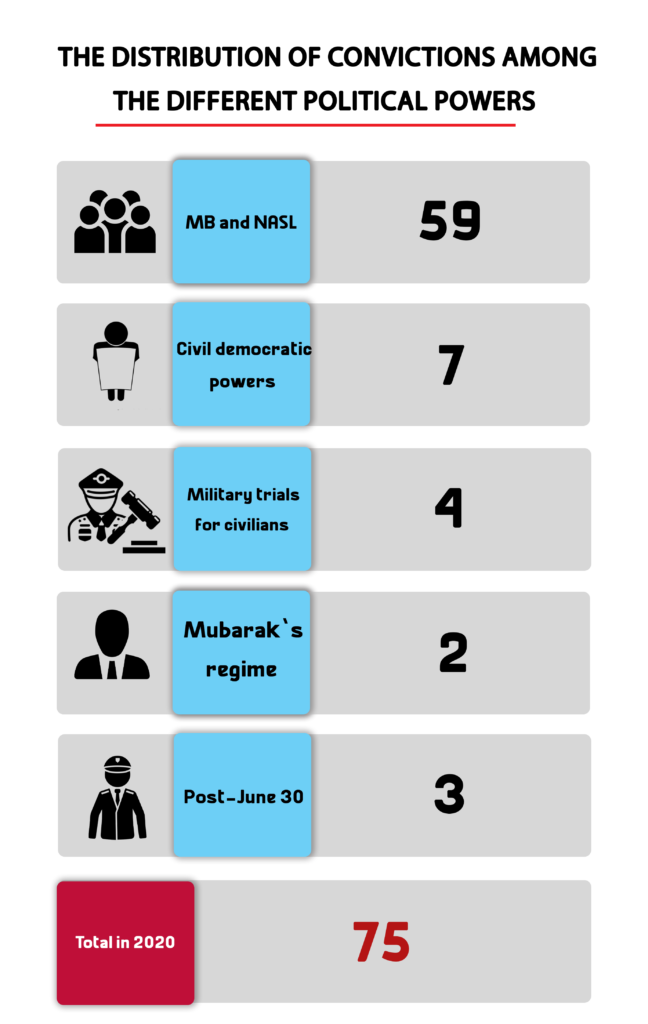
2- Acquittals
During 2020, 22 acquittals in public affairs-related trials have been issued; of these, 4 acquittals were handed in military trials for civilians and 18 in trials before civil courts.
The following table shows the distribution of acquittals
| MB and NASL | Civil democratic powers | Mubarak’s regime | Post-June 30 | Military trials for civilians | Total in 2020 |
| 13 | 2 | 3 | – | 4 | 22 |
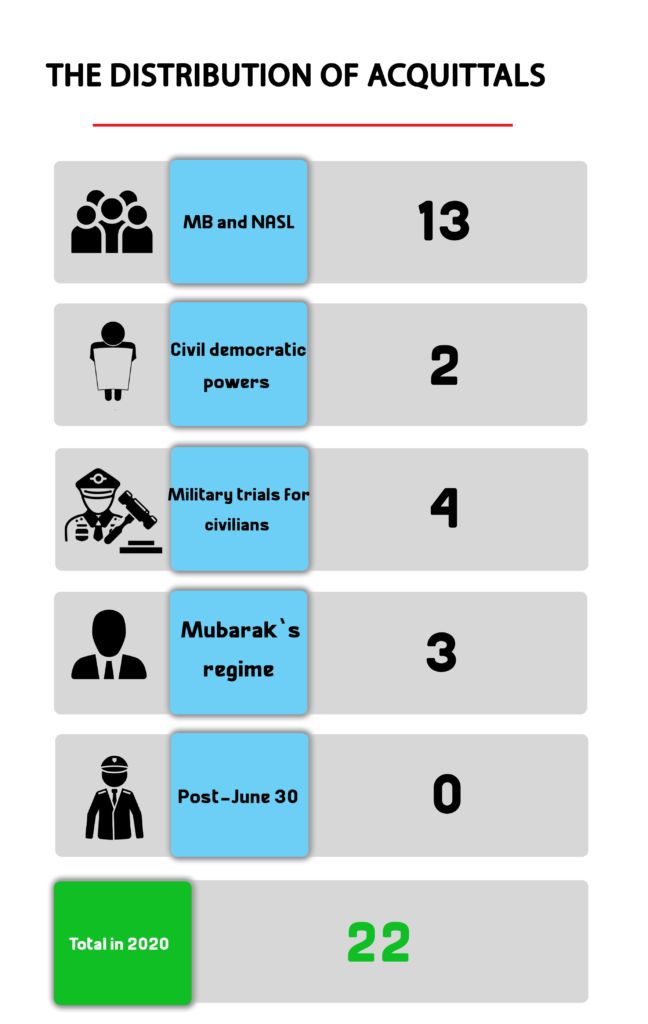
3- Sentences issued with the suspension of execution of the penalty
During 2020, criminal courts issued two rulings of conviction and ruled to suspend the implementation of the penalty in favor of members of the Muslim Brotherhood and the Alliance to Support Legitimacy.
4- Death sentences
13 death sentences were handed down against 78 citizens in 2020.
The following table shows the number of death sentences issued by both civil and military courts
| Death sentences issued by civil courts | Death sentences issued by military courts | Total death sentences |
| 12 | 1 | 13 |
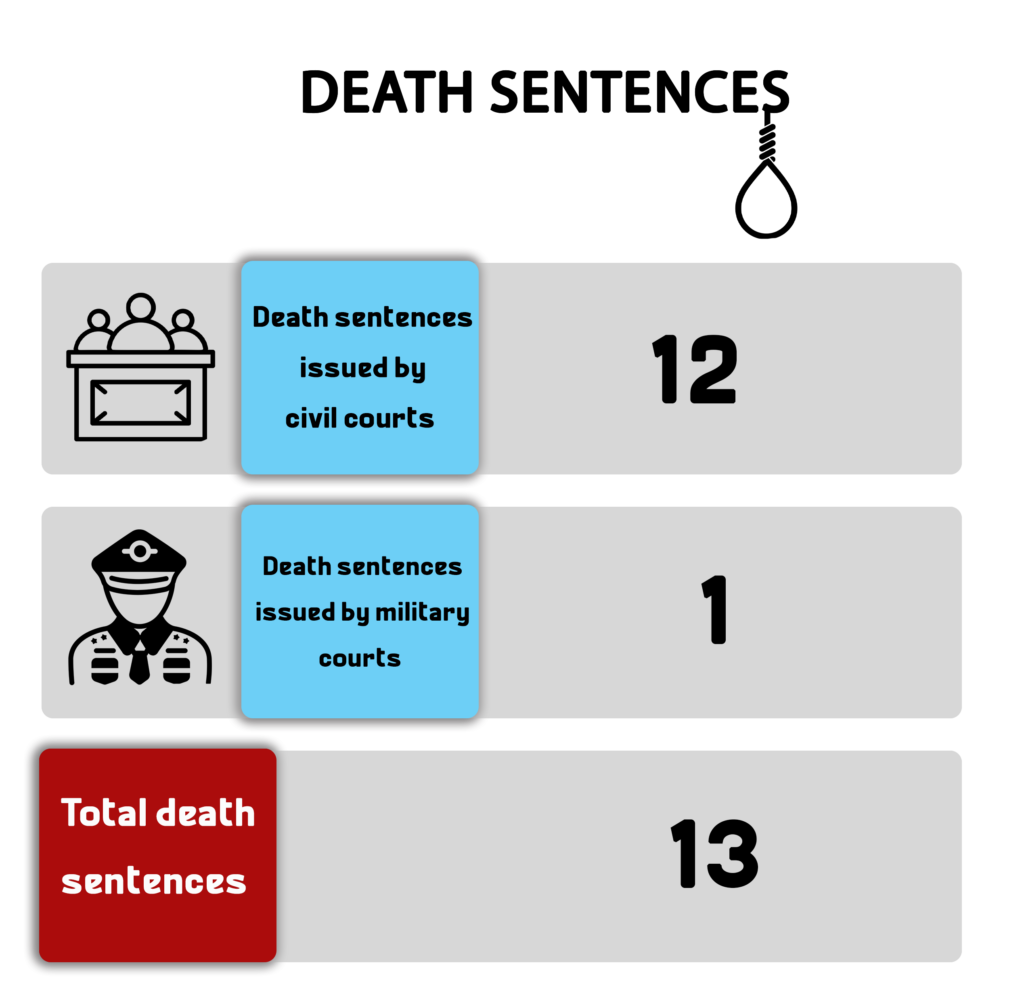
The following table shows the number of defendants who were handed down death sentences in 2020
| Number of defendants referred to the Mufti
|
Number of death sentences confirmed to be executed by the Mufti
|
Number of defendants whose death sentences were confirmed by the Court of Cassation
|
Total number of defendants | |
| Civilian | 3 | 47 | 18 | 68 |
| Military | 0 | 3 | 7 | 10 |
| Total | 3 | 50 | 25 | 78 |
Death sentences executed in 2020:
Egypt’s Prisons Authority sector carried out, in 2020, the death sentences handed down against 105 citizens into criminal and political cases (most of them were carried out during October and November), according to Human Rights Watch and Amnesty International. Of these, ANHRI monitored the execution of the death sentences against 32 defendants in 7 political cases. Details are as follows:
- On 25 February 2020, the Prison Authority sector carried out the death sentence that was issued by the Military Court against 8 defendants in the case publicly known as “The churches bombings”.
- On 4 March 2020, the Prison Authority sector carried out the death sentence that was issued against Egyptian militant leader Hisham Al-Ashmawy in a number of cases considered by civil and military courts.
- On 27 June 2020, the Egyptian authorities carried out the death sentence that was issued by the Military Court against terrorist Abdel Rahim el-Mesmary in the case publicly known as “Al-Wahat checkpoint”.
- On 28 July 2020, the Prison Authority sector carried out the death sentence that was issued by Ismailia Criminal Court against 7 defendants after being convicted of killing Sergeant Ahmed Abu Douma, assistant detective of Ismailia 3rd Police Station in 2013.
- On 3 October 2020, the Prison Authority sector carried out the death sentence issued by Alexandria Criminal Court against two defendants in the case known in the media as “Alexandria bombing”.
- On 4 October 2020, the Prison Authority sector carried out the death sentence issued by Cairo Criminal Court against 10 defendants in the case known in the media as “Agnad Masr Organization”.
- On 4 October 2020, the Prison Authority Sector carried out the death sentence issued by Giza Criminal Court against 3 defendants in the case known in the media as “The raid on Kerdasa police station”.
Chapter 3
Terrorism and Counter-Terrorism Operations
First: Terrorist operations
Terrorist operations declined in 2020 compared to previous years. However, exceptional measures are still being carried out and the state of emergency has not been lifted. On the other hand, terrorists are still targeting members of the armed forces.
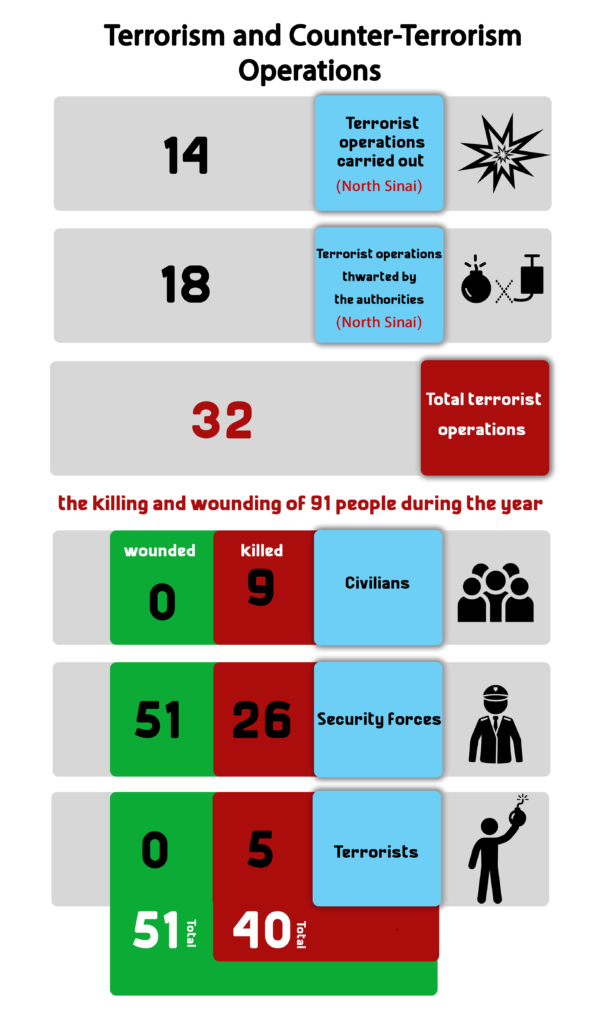
Lawyers for Democracy team monitored 32 terrorist operations carried out in 2020, compared to 400 terrorist attacks in 2015 and 259 operations in 2016.
The following table details the terrorist operations that took place during 2020:
| Terrorist operations carried out | Terrorist operations thwarted by the authorities | Total terrorist operations
|
| 14 | 18 | 32 |
The following table shows the number of terrorist operations in 2020
| Months | Terrorist operations carried out
|
Terrorist operations thwarted
|
Total |
| January | 0 | 0 | 0 |
| February | 3 | 2 | 5 |
| March | 0 | 0 | 0 |
| April | 1 | 3 | 4 |
| May | 1 | 2 | 3 |
| June | 1 | 0 | 1 |
| July | 2 | 1 | 3 |
| August | 3 | 0 | 3 |
| September | 2 | 0 | 2 |
| October | 1 | 3 | 4 |
| November | 0 | 4 | 4 |
| December | 0 | 3 | 3 |
| Total in 2020 | 14 | 18 | 32 |
Terrorist operations in different governorates:
All terrorist operations took place in North Sinai governorate.
The following table details in numbers the terrorist operations and their distribution in different governorates:
| Governorate | Operations carried out | Operations thwarted | Total |
| North Sinai | 14 | 18 | 32 |
These operations resulted in the killing and wounding of 91 people during the year, detailed as follows
| Civilians | Security forces | Terrorists | Total | |
| killed | 9 | 26 | 5 | 40 |
| wounded | 0 | 51 | 0 | 51 |
| Total in 2020 | 9 | 77 | 5 | 91 |
Chapter Four
Attacks against Freedom of Expression and Media Freedoms
Restrictions on media freedoms:
During 2020 has the massive crackdown and ongoing targeting of media freedoms continued. Lawyers for Democracy monitored 154 violations of freedom of the press and media freedoms, compared to 171 violations in 2019, 289 violations in 2016 and 343 in 2015.
The following table shows the number of violations against freedom of expression and media freedoms throughout the year
| Month | Number of violations |
| January | 13 |
| February | 10 |
| March | 11 |
| April | 15 |
| May | 12 |
| June | 13 |
| July | 15 |
| August | 10 |
| September | 13 |
| October | 14 |
| November | 18 |
| December | 10 |
| Total violations in 2020 | 154 |
The following table shows the number of violations committed against freedom of expression and media freedoms:
| Type of violation | Number of violations |
| Investigation, trial and detention renewal sessions | 69 |
| Arrest and detention | 21 |
| Media coverage ban | 15 |
| Administrative sanctions (fines) | 14 |
| Blocking websites | 13 |
| Verbal and physical assault | 7 |
| Confiscation | 4 |
| Ban from appearing in the media | 2 |
| Administrative investigation | 2 |
| Disciplinary measures | 2 |
| Reports to the Public Prosecutor | 2 |
| Court decisions | 1 |
| Gag order (publishing ban) | 1 |
| Clearing/blocking press (journalistic) content | 1 |
| Total in 2020 | 154 |
From the previous table, it is to be noted that there is a large and remarkable increase in the trials and pretrial detention renewal sessions against opinion-makers and journalists because of their views, in addition to the cases of arrest and detention of journalists and media professionals.

Chapter 5
Attacks against Human Rights Defenders
During 2020 there was a continued escalation in the systematic targeting of human rights defenders who have been subjected to constant harassment and violations, which range from arrest and detention to ongoing trials and the use of pretrial detention as a punishment. It also witnessed the rotating/recycling of a number of human rights defenders pending new cases while in remand detention.
At the same time as human rights defenders are subjected to continuous targeting, ten of them received international awards.
First: Violations against human rights defenders:
Pretrial detention, investigations, and travel bans are no longer considered the most serious violations committed against HRDs throughout 2020; rather, the onslaught have escalated and intensified that a number of activists and defenders have been recycled and rotated into new cases whose proceedings started during their detention, entering a vicious and closed circle of pretrial detention orders. Smear campaigns against HRDs haven’t stopped as well.
The following table shows the number of attacks on human rights defenders in 2020:
|
Type of violation |
Number of violations |
| Trial sessions and pretrial detention orders | 143 |
| Rotating/ recycling of HRDs pending new cases | 10 |
| Arbitrary arrest and detention | 9 |
| Precautionary measures (security probation) | 6 |
| Court decisions/ rulings | 4 |
| Seizure of personal property/funds | 3 |
| Placing on Terrorist Entities List | 3 |
| Physical and verbal attacks | 2 |
| Total | 180 |
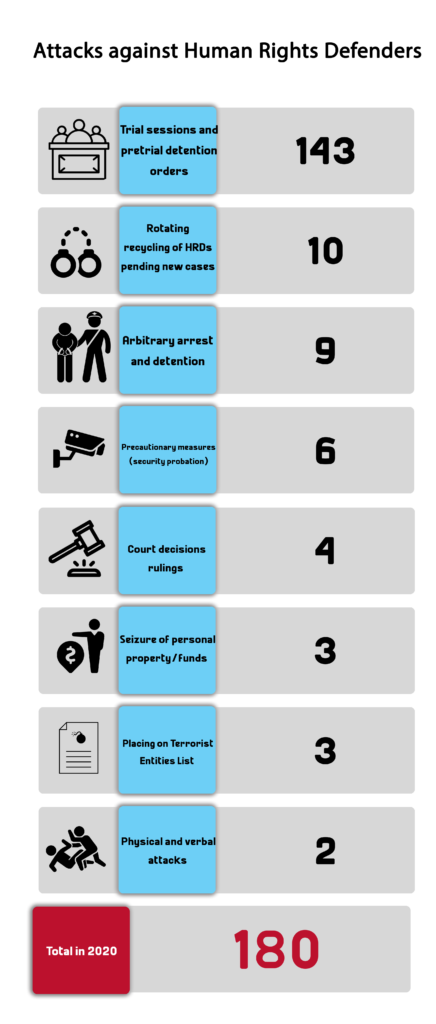
Second: Awards received by human rights defenders:
– Journalist Solafa Magdy was awarded the 2020 Courage in Journalism Award
On 20 May 2020, the International Women’s Media Foundation (IWMF) announced that journalist Solafa Magdy- who has been held in remand detention pending Case No. 488 of 2019 State Security- was awarded the 2020 Courage in Journalism Award.
– Professor Laila Soueif receives the Academic Freedom Award
On 11 October 2020, the Middle East Studies Association announced that the 2020 Academic Freedom Award was presented to Professor Laila Soueif; for being an example that embodies the Egyptian people’s struggle against social, economic and political repression.
– Seven Egyptian HRDs receive the Council of Bars and Law Societies of Europe (CCBE) Award
On 27 November 2020, the Council of Bars and Law Societies of Europe (CCBE) has granted its 2020 Human Rights Award to seven Egyptian lawyers, who are currently in remand detention pending a number of different cases, for their role in defending human rights issues. They are: Ibrahim Metwally Hegazy, Zyiad Al-Eliemy, Haytham Mohamdeen, Mahienour Al-Masry, Mohamed Al-Baqir, Hoda Abdel Moneim and Mohamed Ramadan.
– Human rights lawyer Azza Soliman wins the Franco-German Prize for Human Rights and the Rule of Law
On 11 December 2020, human rights lawyer Azza Soliman received the 2020 Franco-German Prize for Human Rights and the Rule of Law for her role in defending women’s issues and human rights.
Chapter 6
Milestones in the Democratic Path
Influential milestones in the democratic path
During 2020 there was a number of crucial events that have influenced the democratic process and the path of the rule of law, which can be summarized in the following lines:
– The death of former President Mohamed Hosni Mubarak and the declaration of national mourning:
The month of February witnessed the death of former President Mohamed Hosni Mubarak as the Egyptian state declared three days of national mourning after holding a military funeral, which sparked controversy given that Mubarak was stripped of all military honors after his conviction in the “Presidential Palaces” case.
– Suspending court proceedings and preventing the transfer of defendants from their jail to the courthouse or the competent prosecutions to consider their detention renewal sessions
In March 2020, the Supreme Judicial Council issued a decision to suspend court proceedings and the transfer of defendants from their jail to the courthouse or the competent prosecutions to consider their detention renewal sessions; as part of the precautionary measures taken to limit the spread of the coronavirus (COVID-19) pandemic. The authorities, consequently, have extended the pretrial detention of detainees without their presence and without them appearing before a judge or a prosecutor, and hence the phenomenon of “on-paper” detention renewal emerged.
– Amending the law regulating terrorist entities
Also in March, Egypt’s President ratified the amendment to the Law on Terrorist Entities and Terrorists. The recent amendments entail expansion in defining the scope of terrorist entities and the funds belonging to the people designated as terrorists, in addition to extending the enumeration of the consequences of inclusion on designated terrorist lists and the publishing of information on the listing of terrorist entities.
– Extension of the state of emergency:
The imposition of the state of emergency proclaimed by President Abdel Fattah al-Sisi since 2017, following the terrorist bombing of St. Mark’s Coptic Church in Alexandria and Mar Girgis Church in Tanta has continued during the year.
On 26 April 2020, the president issued Decree No. 168 of 2020, which declares a state of emergency throughout the country for a period of three months. Then, on 20 July 2020, the president issued Decree No. 391 of 2020 extending the declaration of the state of emergency nationwide for another 3 months, which was extended further for 3 months on 30 October 2020 by Decree No. 596 of 2020, and since then, the state of emergency has been in force, upon which many cases have been referred to the Supreme State Security courts.
– Amending the Code of Criminal Procedure:
In August 2020, the Egyptian Parliament approved a draft law submitted by the government to amend some provisions of the Code of Criminal Procedure by adding article No. 113 (bis) which states that: “The Public Prosecution or the judge investigating a case of sexual violence is not allowed to reveal any personal information related to the victims during the investigative stage except for those concerned- as is the case in any of the crimes stipulated in Chapter Four of the Penal Code issued by Law No. 58 of 1937, or in any of articles (306 bis A) and (306 bis b) of the same law, or in Article (96) of the Child Law promulgated by Law No. 12 of 1996”. The bill aims at protecting the reputation of victims of sexual harassment and violent crimes by concealing their identity. The amendment was published on 13 September 2020 in the Official Gazette after the President of the Republic ratified it.
Holding the parliamentary elections:
In the last quarter of 2020, the parliamentary elections took place and the pro-government “Mostaqbal Watan” (Nation’s Future) Party swept up the majority of votes. These elections were marred by several practices and violations that echoed those of the dissolved National Democratic Party, and resulted in the fall of a number of political opponents, including the 25-30 Alliance headed by former MPs Haitham Hariri and Ahmed Tantawi.
September 20 incidents:
For the second year in a row, protests erupted across the country, as people took to the streets in many cities and villages all over Egypt’s different cities, in what is known in the media as ‘September 20 Protests’. These demonstrations coincided with the government carrying out demolitions of buildings built illegally on state-owned land, and resulted in the arrest of thousands of citizens, who were later referred to the Supreme State Security Prosecution on charges of: joining a terrorist group, financing and supporting terrorist groups, misuse of social media, publishing and spreading false news and information, and demonstrating without prior notice.
for PDF
for word







